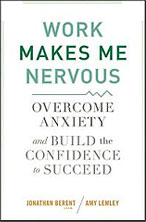Robert
– PUBLIC SPEAKING ANXIETY RESOLVED BY GIFTED SALESMAN
Q: Can you share your story starting with what was going through your mind when you first contacted me?
ROBERT: Well, when I originally called you I was having um, pretty-pretty bad experiences, recurring experiences with anxiety that I was not able to conquer on my own.
Uh, every time that I would um, go into a public speaking type event I
would have more anxiety it seemed than I had the time before. Because, I would take the anxiety of notperforming the last time, plus the anxiety of-of just the actual event and itwould continue to multiply more and more and more. So when I contacted you I-I felt I was at a-abreaking point and I just absolutely had to do something. I had to change what I felt was the cycle andfigure out some sort of solution.
Q: So you were in a position that necessitatedyour doing a lot of public speaking?
ROBERT: Right.
Well it wasn’t um, it wasn’t as though I did public speaking every week
or every month. It would come about, say, every two months, every three months, which was actually more of a problem. I had more time to let the anxiety build up. And it would build up within me so by the time I went to to the public speaking event I was so keyed up, so uh, I had so much anxiety that it was- it was extremely difficult to uh,perform in the way that I wanted to.
Q: What did the anxiety feel like?
ROBERT: Well it was overwhelming. Um, I mean it-it comes from like the… my-my
like core and um, it’s interesting I would feel- I would feel comfortable… let’s
say I was going to my company to public speak and I had to speak in a boardroom, I would feel comfortable in my car, I would feel comfortable driving down, going into the building, getting into my office but as I would approach the boardroom I would have a spiraling effect that would intensify as I got closer to the boardroom. To the point there were times when I-I literally didn’t know if I was going to be able to-to public speak at all, once I got in the room.
The interesting thing was my-my way of dealing with it personally before
I talked with you, was to just continue attacking it. You know, I would never run. That was the thing I would, I had all these different mechanisms that I would come up with to try to um, pull me away from having to do um an event that I felt would be very bad. But if I was ever put in a position where I had to public speak and it was going to be a scenario that I didn’t like I would never run from it. I would always go for it and put myself uh, in the arena, let’s say, and um, there were times when it was um, it was very bad, it was very embarrassing. It was humiliating because I could not speak the way that I wanted to.
Q: Were you experiencing physical symptoms?
ROBERT: Yeah, oh yeah. I mean my hands would tremble um, I would
sweat a bit and without question my voice would shake um, dramatically uh at
some points. And see the interesting thing is you know, people that just saw me five minutes before that came by my office or saw me walk in would see me completely calm, and then I would go into a boardroom or have to go do some sort of public speaking and I would go into what I called, as I said earlier, the spiral effect. And it would just spiral out of control so to the point that I was public speaking uh at my company; it-it could be pretty devastating, because people of course would come up afterwards and say what-what happened? Where, I mean where did you go from being fine when I saw you a moment ago to having such difficulty uh in the room?
Q: You mean people would actually be able to observe the anxiety?
ROBERT: Oh yeah, yeah. It-it was not um, only in my head. I had… I mean the-the issue and the problem that I resolved uh, did come from within me but I would take it so far that I would have physical symptoms that people within the room would absolutelynotice. There’s no doubt.
Q: What were the thoughts going through your mind when you were experiencing the panic?
ROBERT: [SIGH] For me it w- it was this reoccurring um discouragement, depression of not being able to-to beat it. Not being able to figure out a way to conquer this. And I also have a-a bit of perfection that has always plagued me as well. Now it’s interesting, the things that we-we’ve talked about have helped me kind of put those into categories where I can kind of downplay those and see more of perhaps the logic that I used to. But the problem would be I would take it into a negative uh, into like a negative spin and that, and that’s all I would hear in my head, was you know you’re going to try to do this again. You’re going to fail. Everybody’s
going to see that you’re having trouble public speaking. It’s just the same old cycle. You can’t get past it. Why did you think you could do it this time? What makes this any different? And the spiral would just, would just basically take over.
Q: What was the turning point that made you say you had to get some help?
ROBERT: I started-I started with a new company and
all I had to do was just go in… I mean I had gone through the interview process and had done-had done great and this was-this was very typical of me. I do real well in small groups or one-on-one, so I could make it through the interview process. I’m asalesperson. I could go through the sales process, but public speaking in um, in a group of say fifteen to twenty
is where I really, really have a hard time. Speaking in front of groups of two to three-hundred believe it or not was not a problem because I felt very uh disassociated with the audience. I felt the distance. But it was something about bringing fifteen people in a room altogether where everything is quiet and now okay, I’ve got to speak right now and perform. I-I-I would
bring so much performance anxiety into that. I would put all of these huge hurdles, all this baggage I would take in that I-that I had to be perfect, that I had to speak well, that I wasn’t going to be nervous this time. And the turning point and why I contacted you was um, I had gone into a company and all I had to do was go in and basically introduce myself and say what I had done and where I had come from, and it was really, really tough to get through it. And I thought alright, I’ve got to call somebody. And-and find somebody that can
help me understand why uh I can do this at my house alone, I can certainly
introduce myself and say who I am and talk about what I’ve done, but you put me
in a group of fifteen people and many times I would have uh, almost an anxiety
attack as some points uh, to try to get through it.
Q: How severe would you say your problem was in
terms of its overall impact?
ROBERT: It was extremely. Uh, because you can’t- you can’t operate um,
and try to avoid ever public speaking in situations that make you nervous. I mean as I mentioned, mine was inconsistent. Sometimes I would public
speak very well, I would get a bit of a confidence level going uh, and then I
would be presented with perhaps fifteen people in a room I would feel a little
bit of hostility and I-I absolutely could not do it. So, I would think to myself, alright I’ve put together these avoidance techniques and how I can avoid scenarios that I don’t like, scenarios that I don’t think I’ll do well with, realistically how long-how
long can you do that? You can’t do that. You can’t control the entire
environment, you can’t control your entire uh, work scenario or even your
social scenario; people coming over or getting together with family. There’s going to be times that you have to be put in a situation that’s going to make you uncomfortable, so I felt I have to address the issue and not the environment or the-the scenario that I don’tlike. I have to address the issue.
Q: Where would you say that you are at presently
with this problem?
ROBERT: I feel very comfortable in uh, in getting
through it now, as opposed to what I used to.
Um, I categorize things and I think about things from um, much more of a
logical standpoint. Um, i-if you talk with anybody that doesn’t have any social anxiety problems or have never even dealt with it, it’s funny because they’ll be like well what’s the problem? Just go in and talk or-or whatever the issue may be. All you have to do is go in and
do it. You can do it. But to the person that suffers from it it’s
just overwhelming to have to do it. So where I’m at right now is a lot of that logic that I would hear from my friends and family members who would say look, I know you can do this. Why-why are you even thinking that you can’t? A lot of that logic has been um
accepted by me which is where it needed to be accepted and now I feel more
comfortable in going in and um speaking.
Introducing myself.


